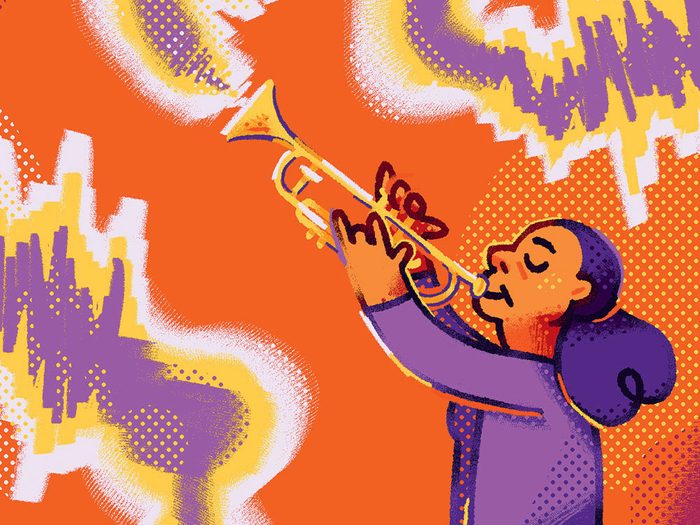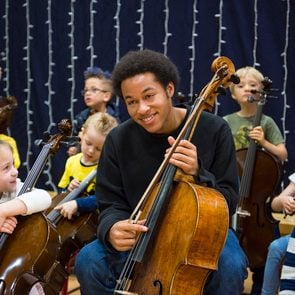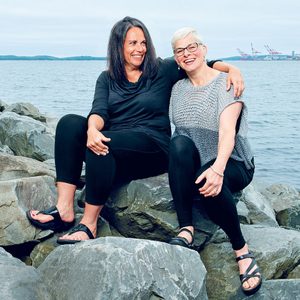Why Learning New Skills as an Adult Is Easier than You Think

I started playing the trumpet at 42. Here are three easy tips to help you start new hobbies at any age.
My first note
Last February, before the world went into lockdown, I sat in a cramped waiting room with about 10 other people, all under age 12. “I’m dyyying!!” I texted my friend, shaking with silent laughter. “What am I doing here?!”
Here was a music academy, and I was about to take my first trumpet lesson. Learning to play was something I had talked about for years, for no reason other than I thought it would be fun. But it wasn’t until my husband gave me a trumpet for Christmas that I got the final push to give it a try.
I was floundering. In three years I’d had two kids, left a full-time job to freelance, and we’d moved across the country. I wanted something that was invigorating, a little out of left field and, most importantly, just for me.
I’ve never mastered a musical instrument before and had lived with the quiet shame of being called tone deaf since I was a kid (I’m not, for the record). But there I was at 42, throwing my lot in with a bunch of preteen mini Mozarts. I was simultaneously nervous and thrilled by the idea of starting something new.
It had been years since I’d tried a hobby in which I had no background, no connections, no baseline knowledge. I was curious to see if I could hack it. As it turned out, I could—and with a few simple tips, so can anyone.
Embrace discomfort and have fun
As adults, we’re reluctant to go outside of our comfort zones. We may fear looking foolish or making mistakes. But there are advantages to being an adult learner. If you’ve chosen to explore a hobby, it’s because you genuinely want to. You’re motivated to learn. And you bring a wealth of experience that you can connect with to help learn new material.
“The wonderful thing about being older is that you have more time and opportunity to try new things,” says Dr. Marnin Heisel, a clinical psychologist and professor at Western University whose research focuses on psychological resiliency and well-being among older adults. It’s easier to convince yourself to cut loose and have fun. “Some people step back, take a look and say, ‘My life isn’t as fun or fulfilling or meaningful as it could be. And the main thing stopping me is me.’”
If you’re stuck on what to do or where to start, Heisel suggests a simple technique: adult show and tell. It’s easy. Imagine you had to present a meaningful or sentimental object to a group of strangers that tells them something about your story or your personality. Consider why you love it. Then ask, what sort of fulfilling pastime can I build around it? You’re more likely to dive into a new activity if you already have a positive association with it.
There are physical benefits, of course, to choosing hobbies and activities that get you moving, and physical activity, in turn, has beneficial effects on executive functions and memory. Most crucially, chasing hobbies that offer positive and meaningful experiences makes us happier and could also make us more adaptable to the inevitable changes in life, says Heisel. “When we look ahead to the future,” he adds, “most of us are also concerned with life satisfaction and enjoyment, not just warding off cognitive impairment, as important as that may be.” (Learn about the surprising benefits of stress-baking.)
Go with the flow
Once you find a hobby that you happily look forward to doing, more benefits will come—especially if you tap into “the flow.” That’s the term coined by prominent psychologist and author Mihaly Csikszentmihalyi to describe when you’re fully immersed in a challenging, absorbing activity—time flies, self-consciousness disappears and the world around you melts away.
Sixty-six year old Rob Doggett recognizes that flow every time he climbs on his Suzuki dual-sport motorcycle. “Being on the road, it’s exhilarating,” he says. “The wind whistles in my helmet, and I’m laser-focused on everything around me. There’s no time for daydreaming. It tests everything: attention to detail, alertness, mental stamina.”
Doggett, a retired restaurant owner, learned to ride when he was in his mid-50s. He’d always been drawn to motorcycles but wasn’t comfortable taking on the risk of riding until his three children were grown. It’s now part of a collection of activities—golf, curling, umpiring rec-league baseball, handiwork—that he does to stay active in retirement. “The more active I am, the more reason I have to get out of bed in the morning,” says Doggett. “It keeps me young.” (Check out these 40+ secrets to a happier life.)
Make a connection, and don’t give up
If new hobbies don’t in and of themselves have a social element, it often doesn’t take much to make them social, says Heisel—and it can help to keep you invested and having fun. If you want to learn to paint, learn to paint with other people. If you want to garden, get to know the horticulturist at your local garden centre. If finding a physical community is too challenging (and these days it can be), go online, find a group, build social connections and try new things, all while staying comfortably close to home.
Here’s how it works for me: I now take trumpet lessons over Zoom, which holds me to playing at least once a week (I’m accountable); my teacher is an impossibly patient and lovely person (I feel supported); when I started in February, I promised my son that I’d learn to play “Happy Birthday” for when he turned three in May (I gave myself a goal and a deadline); and I even participated in an online summer recital (I connected with a new community, under pandemic conditions no less).
I know playing trumpet won’t solve my existential middle-aged-mom crisis, but it’s loud and it’s fun and I like that I can toot-toot my way through a “Happy Birthday” serenade for special people. Plus, I’m investing in future fulfillment, a more balanced life and long-term fine-tuning for my brain, which all feels pretty great.
Next, here’s how to take better care of yourself during the pandemic.






